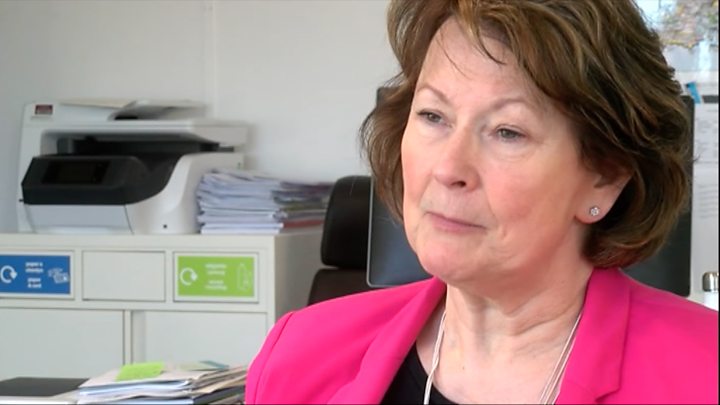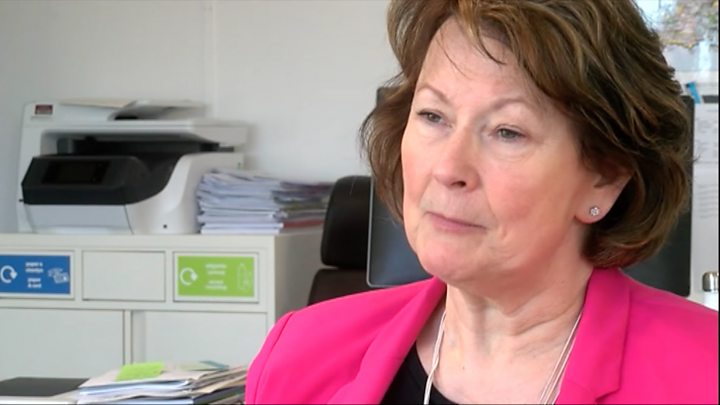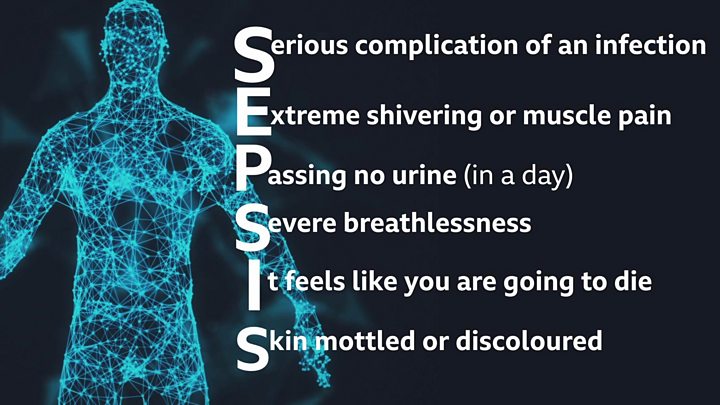Welsh NHS help for sepsis survivors ‘non-existent’
More than 10,000 people get sepsis each year in Wales and about 2,000 die, according to a charity. …


Media playback is unsupported on your device
Support from the Welsh NHS after sepsis was like being on a rollercoaster “blindfolded”, a Tory politician who survived the illness has said.
AM Angela Burns and the charity UK Sepsis Trust said help for survivors was non-existent.
They want patients to be given more information when they are discharged and follow-up help with their recovery.
More than 10,000 people get sepsis each year in Wales and about 2,000 of them die, the charity said.
People get sepsis when the body attacks itself in response to an infection.
Many recover within 18 months, but some suffer serious long-term physical and psychological problems – associated with what is known as “post-sepsis syndrome”.
The UK Sepsis Trust says these include post post-traumatic stress disorder (PTSD), anxiety, depression, insomnia, poor mobility, fatigue and muscle wasting.

Media playback is unsupported on your device
Mrs Burns, who speaks on health matters for the Conservatives in the Welsh Assembly, contracted sepsis when she had pneumonia.
After being discharged, she said she there was no help for the psychological effects.
“You are very alone. I didn’t have any support, I didn’t understand, what was going on, and I had never really in my life suffered depression, so that was a new thing for me.
“I know sepsis survivors who have woken up and had their limbs amputated.
“It’s like being in a massive road traffic accident where your entire life was turned completely upside-down,” she said.
Mrs Burns said her GP was not told she’d had sepsis, and she needed counselling.
“It was just a rollercoaster ride – I was blindfolded and I had no idea,” she said.
Mrs Burns still has memory loss, fatigue and lower immunity.
Terence Canning, from the UK Sepsis Trust, said NHS support for sepsis survivors across Wales “isn’t existent”.
“I think because sepsis is relatively new in terms of health care. It certainly doesn’t have the aftercare that, say heart attacks, strokes, cancer would have. It just isn’t there for them,” he said.
“I think early follow-up appointments would be really useful or basic signposting on discharge, even to a charity like Sepsis Trust or support groups, so people can access support early.”
Mrs Burns wants patients to be given information packs and GPs to be notified.
‘You leave hospital after having sepsis and you get nothing’
Cardiff dad Chris Toozer, 45, contracted sepsis twice after stomach and bowel surgery in 2016 and 2017.
“I had PTSD, severe anxiety, weight loss, lots of vitamin deficiencies, and other problems,” he said.
“Out of desperation I Googled it and found the Sepsis Trust website and I spoke to the nurses there.
“It was the first time in months that I thought, it isn’t me feeling thinking all this, this is actually real.
“I started going to the support group meetings then and that’s when I found out about post-sepsis syndrome.
“You leave hospital after having sepsis and you get nothing.”
The Welsh Government said: “We are supporting the development of the sepsis registry – led by Public Health Wales in collaboration with all health boards – which focuses on long-term outcomes for people who have had sepsis.
“The first phase of this work will be completed this summer.”
- Politics Wales is on BBC One Wales at 10:00 GMT on Sunday 9 February

